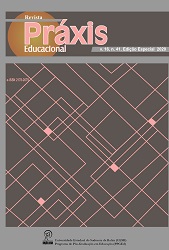THE OECD AND THE TEACHER TRAINING: The TALIS in question
DOI:
https://doi.org/10.22481/praxisedu.v16i41.7255Keywords:
International Organisms, Teacher Training, TALISAbstract
The international organizations (IOs) have seen in education the means for economic growth and in the teacher, the professional responsible for conformation of individuals at that society of knowledge. The Ois have performed research and elaborated documents relating to the role of the teacher, the function of the school and the competencies and skills necessary for the development of a citizen of the twenty-first century. The paper presents some results of a research, in process, funded by CNPq, "Internationalization of Higher Education, International Bodies and the impacts on Teacher Training Programs", and has how its focus the OECD and the TALIS, seeking to bring elements about the teacher training. The methodology is based on the dialectical and historical materialism, what allowed to apprehend the phenomenon (teacher training) in its entirety, by examining the contradictions and mediations that pervades it. The discourse analysis (Fairclough, 2001) made exploited the OECD documents, whereas the discursive practice and social practice expressed in the texts. The first results point to the influence of the OECD in actions relating to the training of teachers. The paper will be divided in three stages: the first is the characterization of the international context and the impacts on education; the second examines the position of the OECD in relation to education; and finally, it will be considered the findings and recommendations that the OECD made from TALIS, in relation to the teaching work.
Downloads
Downloads
Published
Issue
Section
License

This work is licensed under a Creative Commons Attribution-ShareAlike 4.0 International License.
Você é livre para:
Compartilhar - copia e redistribui o material em qualquer meio ou formato; Adapte - remixe, transforme e construa a partir do material para qualquer propósito, mesmo comercialmente. Esta licença é aceitável para Obras Culturais Livres. O licenciante não pode revogar essas liberdades, desde que você siga os termos da licença.
Sob os seguintes termos:
Atribuição - você deve dar o crédito apropriado, fornecer um link para a licença e indicar se alguma alteração foi feita. Você pode fazer isso de qualquer maneira razoável, mas não de uma forma que sugira que você ou seu uso seja aprovado pelo licenciante.
Não há restrições adicionais - Você não pode aplicar termos legais ou medidas tecnológicas que restrinjam legalmente outros para fazer qualquer uso permitido pela licença.












